| |
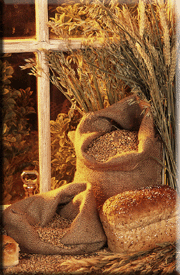
There Is No One Like God
In our continuing research into codes passing through the "Who Is Like God?" verses of Isaiah 40-46, we searched for the phrases There Is No Man, Indeed No Man, Indeed No One, and Who Is Like God?. Nathan Jacobi, Ph.D., parsed and translated the ELSs.
In each section of this article, we will introduce some of the codes and give our thoughts on them, as well as the Scriptures we believe they echo. Then tables will be presented with the complete results of our research on these phrases.
There Is No Man
We began with the Hebrew phrase from Isaiah 41:28, There Is No Man (      ). To see the text in full, visit Mechon-Mamre.org. ). To see the text in full, visit Mechon-Mamre.org.
Four out of the 10 shortest skips resulted in extensions. Of those four, we found that three of them appear to express a Biblical point of view.
Where Is God Within Me?
There is no man. Where is God within me? Will he warm up to her?
We imagine that this code could be a quote from the prophet Isaiah. The second sentence is reminiscent of Isaiah 6:5:
Woe is me, for I am undone!
Because I am a man of unclean lips,
And I dwell in the midst of a people of unclean lips;
For my eyes have seen the King,
The LORD of hosts. (NKJV)
The first and second sentences are also reminiscent of another verse from the book of Isaiah:
But we are all like an unclean thing,
And all our righteousnesses are like filthy rags;
We all fade as a leaf,
And our iniquities, like the wind,
Have taken us away. —Isaiah 64:6 (NKJV)
If that were the case, the third sentence of the code, Will he warm up to her? could be one where "he" refers to God and "her" refers to mankind, since masses of people are typically in the feminine gender in Hebrew. If so, then the last sentence could be read as, "Will God warm up to mankind?" This question makes great sense in term of the first two sentences of the code, There is no man. Where is God within me?, as though the speaker is crying out over the emptiness of a life without God.
He Will Carry a Tree
Where is his hand, the hook? There is no man. He will carry a tree.
The first sentence could refer to one of Jesus' hands, pierced by a nail (hook?) that fastened it to His cross. There is no man could reference the deity of Christ, and He will carry a tree Christ carrying His cross. John 19 describes Jesus carrying His cross, and Acts 13 describes Him being taken down from the tree.
Then he delivered Him to them to be crucified. Then they took Jesus and led Him away. And He, bearing His cross, went out to a place called the Place of a Skull, which is called in Hebrew, Golgotha, where they crucified Him, and two others with Him, one on either side, and Jesus in the center. —John 19:16-18 (NKJV)
*****
And though they found no cause for death in Him, they asked Pilate that He should be put to death. Now when they had fulfilled all that was written concerning Him, they took Him down from the tree and laid Him in a tomb. But God raised Him from the dead. —Acts 13:28-30 (NKJV)
And so we see the cross being referred to as "the tree."
My Sea Has Surged
And my sea has surged since there is no evil man
that was established in it like a father.
This could be a message from God's perspective, in which He is speaking about the great prospering of Israel during the reign of David, "a man after God's own heart" (1 Samuel 13:12-13 and Acts 13:22) that followed the reign of the evil king, Saul.
The evil ways of Saul are cited in many verses, such as:
During David's reign, the kingdom of Israel expanded to the greatest extent in the entire history of Israel.
Then all the tribes of Israel came to David at Hebron and spoke, saying, "Indeed we are your bone and your flesh. Also, in time past, when Saul was king over us, you were the one who led Israel out and brought them in; and the LORD said to you, 'You shall shepherd My people Israel, and be ruler over Israel.' " Therefore all the elders of Israel came to the king at Hebron, and King David made a covenant with them at Hebron before the LORD. And they anointed David king over Israel. David was thirty years old when he began to reign, and he reigned forty years. In Hebron he reigned over Judah seven years and six months, and in Jerusalem he reigned thirty-three years over all Israel and Judah. —2 Samuel 5:1-5 (NKJV)
The ending of this code, which refers to an evil man that was established in it like a father strongly suggests when the children of Israel cried out to Samuel to give them a king (1 Samuel 8:5, see also 1 Samuel 8-9).
Also of note: In the Bible, the sea often symbolizes masses of people:
You who still the noise of the seas,
The noise of their waves,
And the tumult of the peoples. —Psalm 65:7 (NKJV)
*****
Woe to the multitude of many people
Who make a noise like the roar of the seas,
And to the rushing of nations
That make a rushing like the rushing of mighty waters! —Isaiah 17:12 (NKJV)
*****
But the wicked are like the troubled sea,
When it cannot rest,
Whose waters cast up mire and dirt. —Isaiah 57:20 (NKJV)
A Teacher to Fish, a Ready Lamb
There is no man within you like this bitter one, a teacher to fish, a ready lamb.
Many Christians, if asked whether Jesus was ever bitter, might say, "No," thinking that He was above bitterness. And yet, an unbiased reading of Matthew 23 suggests much bitterness. Bitterness can be righteous. As Jesus wept over Jerusalem, surely there was a righteous bitterness in His Heart (Matthew 23:37-39).
Jesus was frequently called teacher, and a teacher to fish could refer to his teaching the disciples to be fishers of men as well as providing fish for them to eat.
And Jesus, walking by the Sea of Galilee, saw two brothers, Simon called Peter, and Andrew his brother, casting a net into the sea; for they were fishermen. Then He said to them, "Follow Me, and I will make you fishers of men." They immediately left their nets and followed Him. —Matthew 4:18-20 (NKJV)
*****
Then Jesus said to them, "Children, have you any food?" they answered Him, "No."
And He said to them, "Cast the net on the right side of the boat, and you will find some." So they cast, and now they were not able to draw it in because of the multitude of fish. —John 21:5-6 (NKJV)
The last phrase, A ready lamb, could refer to Christ being the unblemished lamb, the sacrifice for sin. We find the symbolism of Him being the lamb in both the Old and New Testaments.
All we like sheep have gone astray;
We have turned, every one, to his own way;
And the LORD has laid on Him the iniquity of us all.
He was oppressed and He was afflicted,
Yet He opened not His mouth;
He was led as a lamb to the slaughter,
And as a sheep before its shearers is silent,
So He opened not His mouth.
He was taken from prison and from judgment,
And who will declare His generation?
For He was cut off from the land of the living;
For the transgressions of My people He was stricken. —Isaiah 53:6-8 (NKJV)
*****
The next day John saw Jesus coming toward him, and said, “Behold! The Lamb of God who takes away the sin of the world! —John 1:29 (NKJV)
*****
Then I looked, and I heard the voice of many angels around the throne, the living creatures, and the elders; and the number of them was ten thousand times ten thousand, and thousands of thousands, 12 saying with a loud voice:
"Worthy is the Lamb who was slain
To receive power and riches and wisdom,
And strength and honor and glory and blessing!"
And every creature which is in heaven and on the earth and under the earth and such as are in the sea, and all that are in them, I heard saying
"Blessing and honor and glory and power
Be to Him who sits on the throne,
And to the Lamb, forever and ever!" —Revelation 5:11-13 (NKJV)
Here are the complete findings for There Is No Man.
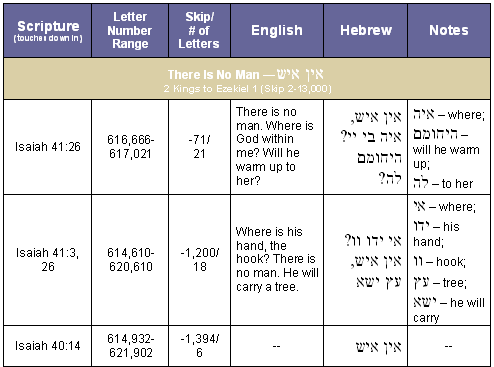
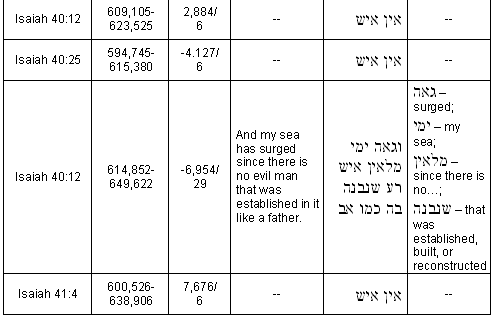
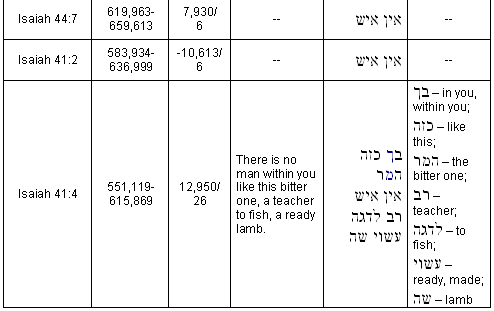
Indeed No Man
To our surprise, the first six skips of Indeed No Man did not yield any extensions, but the last four yielded lengthy findings (52, 49, 50, and 33 letter long codes). In the first one, we again find the symbolism of the lamb.
Who Is the Son?
The lamp had mercy on your looks that hovered over there,
and enough of anybody worth anything. The father whose mouth you hate
totally has turned to the lamb. Who is the son?
The sentence, The father . . . has turned to the lamb, is reminiscent of two Old Testament passages:
When Isaac asked Abraham where the lamb was for the offering, not knowing he was the intended lamb.
But Isaac spoke to Abraham his father and said, "My father!"
And he said, "Here I am, my son."
Then he said, "Look, the fire and the wood, but where is the lamb for a burnt offering?" —Genesis 22:7 (NKJV)
And when Moses called upon the elders of Israel to kill the Passover lamb.
Then Moses called for all the elders of Israel and said to them, "Pick out and take lambs for yourselves according to your families, and kill the Passover lamb." —Exodus 12:21 (NKJV)
It also reminds us of several passages in the New Testament that refer to Christ as the Lamb of God:
The next day John saw Jesus coming toward him, and said, "Behold! The Lamb of God who takes away the sin of the world!" —John 1:29 (NKJV)
*****
And looking at Jesus as He walked, he said, "Behold the Lamb of God!" —John 1:36 (NKJV)
*****
And if you call on the Father, who without partiality judges according to each one's work, conduct yourselves throughout the time of your stay here in fear; knowing that you were not redeemed with corruptible things, like silver or gold, from your aimless conduct received by tradition from your fathers, but with the precious blood of Christ, as of a lamb without blemish and without spot. He indeed was foreordained before the foundation of the world, but was manifest in these last times for you who through Him believe in God, who raised Him from the dead and gave Him glory, so that your faith and hope are in God. —1 Peter 1:17-21 (NKJV)
Also, Who is the son? brings to mind the conversation between Jesus and Simon Peter.
When Jesus came into the region of Caesarea Philippi, He asked His disciples, saying, "Who do men say that I, the Son of Man, am?"
So they said, "Some say John the Baptist, some Elijah, and others Jeremiah or one of the prophets."
He said to them, "But who do you say that I am?"
Simon Peter answered and said, "You are the Christ, the Son of the living God." —Matthew 16:13-16 (NKJV)
Where Is the Official Teacher?
Who is the force that made you swim?
Where is the official teacher?
Who is forming the support in the heat?
No man, and so indeed they formed me and I would be seated.
This entire code seems to be a reference to the Holy Spirit, and is quite reminiscent of Jeremiah 31:31-34.
In the third sentence of the code, heat could refer to persecution, as in the modern expression, "Can you take the heat?" In the last sentence of the code, I would be seated is reminiscent of many references to the way that the Holy Spirit is established within a person—1 Samuel 10:6 provides an example:
The Spirit of the LORD will come upon you in power, and you will prophesy with them; and you will be changed into a different person. (NIV)
A King, and the Son of No Man
Thus I am a king, and the son of no man. Will you serve her?
Where is my Lord? He will humiliate them, perhaps a teacher will be
taken away from her, and the friend will live.
As we look at the first phrase, Jesus was called the King of the Jews by Pilate, the guards who beat Him mocked Him with that title, and Pilate placed the title above Him on the cross in three languages.
"But you have a custom that I should release someone to you at the Passover. Do you therefore want me to release to you the King of the Jews?" —John 18:39 (NKJV)
*****
So then Pilate took Jesus and scourged Him. And the soldiers twisted a crown of thorns and put it on His head, and they put on Him a purple robe. Then they said, "Hail, King of the Jews!" And they struck Him with their hands. —John 19:1-3 (NKJV)
*****
And He, bearing His cross, went out to a place called the Place of a Skull, which is called in Hebrew, Golgotha, where they crucified Him, and two others with Him, one on either side, and Jesus in the center. Now Pilate wrote a title and put it on the cross. And the writing was: JESUS OF NAZARETH, THE KING OF THE JEWS.
Then many of the Jews read this title, for the place where Jesus was crucified was near the city; and it was written in Hebrew, Greek, and Latin.
Therefore the chief priests of the Jews said to Pilate, "Do not write, 'The King of the Jews,' but, 'He said, "I am the King of the Jews." ' "
Pilate answered, "What I have written, I have written." —John 19:17-22 (NKJV)
The second phrase, And the son of no man, echoes the Gospels and their account of His immaculate conception.
Now the birth of Jesus Christ was as follows: After His mother Mary was betrothed to Joseph, before they came together, she was found with child of the Holy Spirit. —Matthew 1:18 (NKJV)
The remainder of the code is mysterious.
The Poetry of Jesus
Place the internally repenting by the poetry of Jesus,
as my father groomed me and may name like no man.
This code, with its reference to the poetry of Jesus, is reminiscent of Matthew 7:24-27:
"Therefore everyone who hears these words of mine and puts them into practice is like a wise man who built his house on the rock. The rain came down, the streams rose, and the winds blew and beat against that house; yet it did not fall, because it had its foundation on the rock. But everyone who hears these words of mine and does not put them into practice is like a foolish man who built his house on sand. The rain came down, the streams rose, and the winds blew and beat against that house, and it fell with a great crash." (NIV)
In the Bible, there are many examples of a person being given a new name to symbolize the changing of that person into someone obviously greater than who they previously were. Examples include Abram—Abraham, Jacob—Israel and Saul—Paul. In this sense, naming like no man represents the life changing power of God transforming a person into a much greater human being.
Here are the complete findings for Indeed No Man.
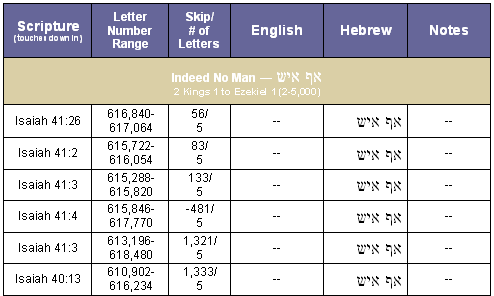
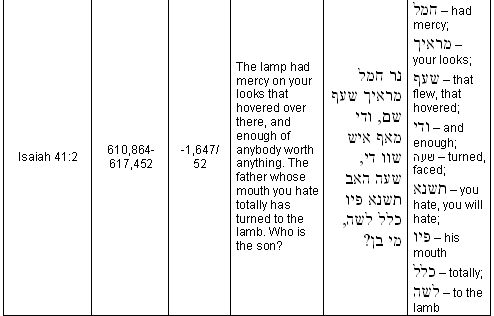
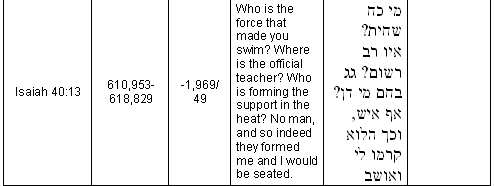
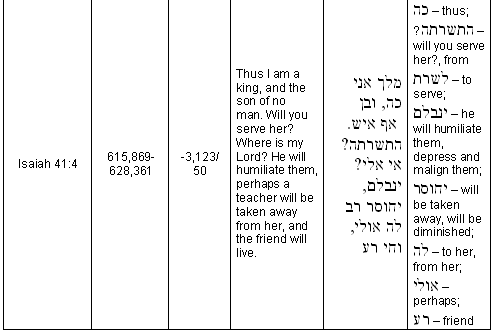
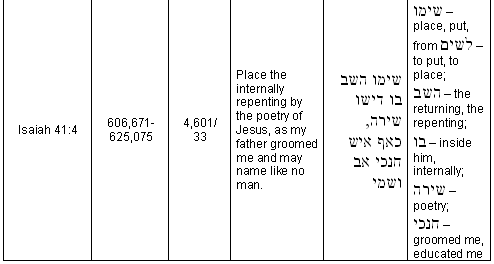
Indeed No One
Half of the searches on Indeed No One yielded findings, but they are all rather mysterious.
A Cry Has Rested in God
Where across are you carrying? And this one has mixed in them her heart.
A cry has rested in God. He will strike the monument, and one will be a secret.
The language of this code is so general that it could refer to a very wide range of situations. The third sentence, A cry has rested in God, is quite reminiscent of the oft-repeated phrase in the Bible: "Hear our prayer, O God!"
The first phrase in the last sentence, He will strike the monument, evokes Deuteronomy 13:16:
Gather all the plunder of the town into the middle of the public square and completely burn the town and all its plunder as a whole burnt offering to the LORD your God. It is to remain a ruin forever, never to be rebuilt. (NIV)
The Hebrew word for "ruin" is the same as the one for "monument" in the code.
And the last phrase, One will be a secret, calls to mind Proverbs 25:2:
It is the glory of God to conceal a matter,
But the glory of kings is to search out a matter. (NKJV)
Here are the complete findings for Indeed No One.
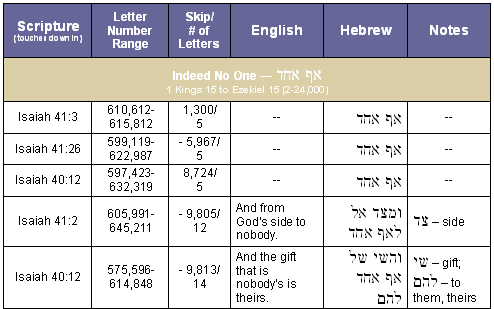
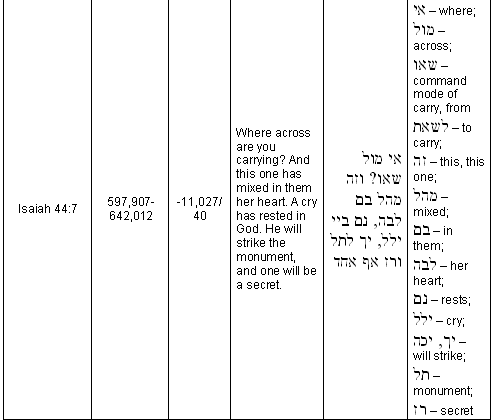
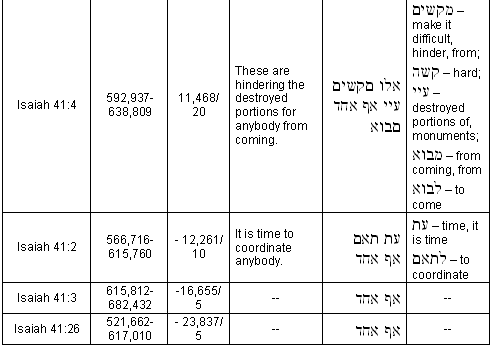
Who Is Like God?
Three out of 10 searches resulted in extensions. The last sentence of the first one is full of Christian meaning.
Owes My Value, and a Lamb
My Lord owes my value, and a lamb will come to him.
Owes My Value
The first portion of this sentence says The Lord owes my value. The questions to ask are "what is my value?" or "why would the Lord owe my value?". The value would be the amount it would take to ransom or pay the price for someone's sin. The Old Testament clearly outlines the price for sin. In Leviticus 4, it states to atone for sin, blood must be shed. Romans 3:23 states, "for all have sinned and fall short of the glory of God.", and Romans 6:23 states, "For the wages of sin is death, but the gift of God is eternal life in Christ Jesus our Lord."
During the Last Supper, Jesus explains that His blood will be shed for the remission of sins. Rather than having to do yearly sacrifices, as outlined in Leviticus, His blood is the fulfillment of the payment for our sin.
See also Ephesians 1:7, 1 John 2:2, and 1 John 4:10.
A Lamb Will Come to Him
Leviticus 4:32-35 further explains the use of a lamb as a sin offering. The phrase a lamb will come to him certainly paints a picture of John 1:29, when John the Baptist saw Jesus coming towards him, he exclaimed, "Behold! The Lamb of God who takes away the sin of the world!"
Gift of Bread, and Where Is He?
The gift of bread, Who is like God? And where is He?
Gift of Bread
Most vividly, in John 6:51 Jesus says, "I am the living bread which came down from heaven. If anyone eats of this bread, he will live forever; and the bread that I shall give is My flesh, which I shall give for the life of the world." This Living Bread is a gift from heaven. In John 6:35, Jesus says, "I am the bread of life. He who comes to Me shall never hunger, and he who believes in Me shall never thirst." And in John 6:48 He simply states, "I am the bread of life."
Where Is He?
According to John 20:11-13, Mary Magdalene went to the tomb and could not find Jesus' body.
But Mary stood outside by the tomb weeping, and as she wept she stooped down and looked into the tomb. And she saw two angels in white sitting, one at the head and the other at the feet, where the body of Jesus had lain. Then they said to her, "Woman, why are you weeping?"
She said to them, "Because they have taken away my Lord, and I do not know where they have laid Him." (NKJV)
Where is He? He is risen. She turned around and was face-to-face with her Risen Savior.
Below are the results for the Who Is Like God? search.
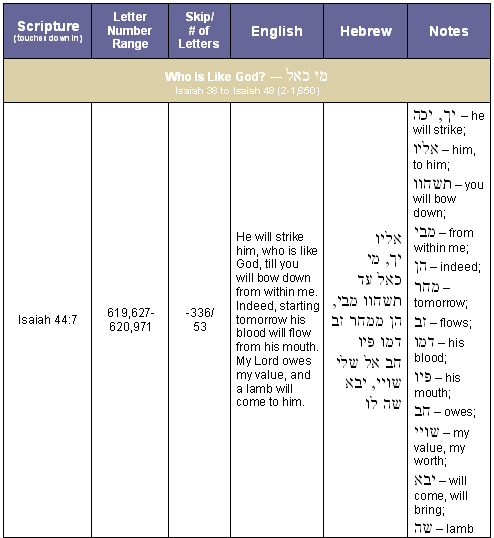
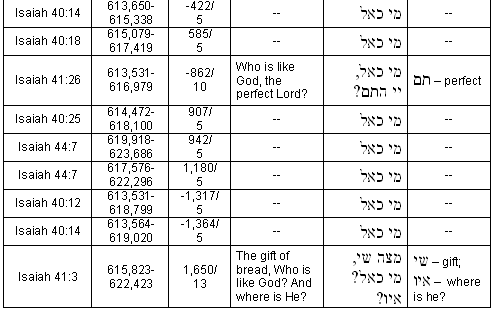
Closing Thoughts
Combined with our previous findings presented in the articles Yeshua Codes in Isaiah 40-46 and Highly Significant Buddha Codes Found in Isaiah 40-46, the Isaiah 40-46 cluster is becoming quite significant, and has joined the ranks with the other growing clusters we've found over the years—something the skeptics have never been able to find in another text.
Scripture quotations marked "NKJVTM" are taken from the New King James Version®. Copyright © 1982 by Thomas Nelson, Inc. Used by permission. All rights reserved.
Scripture quotations marked "NIV" are taken from the HOLY BIBLE, NEW INTERNATIONAL VERSION®. NIV® Copyright ©1973, 1978, 1984 by International Bible Society. Used by permission of Zondervan. All rights reserved.
|
Enjoy finding your own Bible codes.
Bible code search software is available in our online store.
Subscribe Free! Sign Up Today!
Become a member of the non-profit Isaac Newton Bible Code Research Society.
Not only will you be part of the world's leading organization researching and publicizing Bible and Torah codes, but you will receive Bible Code Digest absolutely free, including . . .
- Latest Bible Code News
- Easy-to-Understand Bible Code Feature Articles
- Exciting Inside Information from Leading Code Researchers
- Details of Great New Discoveries
- Summaries of the Latest Battles Between Code Proponents and Skeptics
Stay current on Bible code news. Be first to hear about all of the latest Bible code discoveries.
Sign up to receive Bible Code Digest today.
|
|


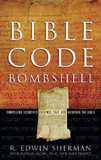 
Bombshell examines two massive, recently discovered clusters of codes in the Hebrew Old Testament. To read more about Bombshell, click here, or click below to order from Amazon today!
 
|







